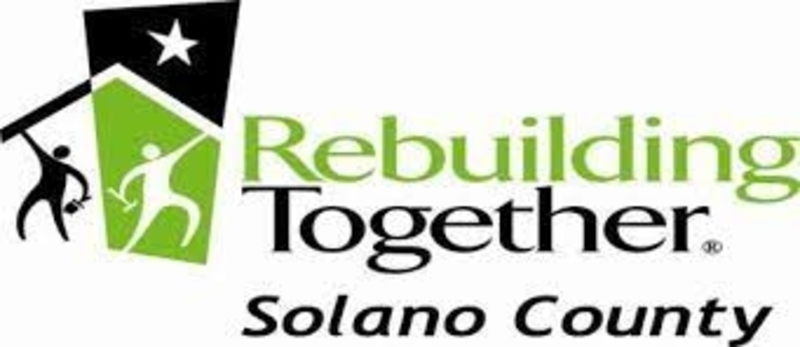City Government
Rebuilding Together Solano County Provides Food, Shelter to People in Need
In partnership with Vallejo Costco and the Solano Contra Costa Food Bank (as part of Feeding America), RTSC’s food pantry opens at 12:00 p.m. Wednesdays and Thursdays at the Vallejo Community Presbyterian Church (2800 Georgia St.) for low-income veterans, seniors, and disabled homeowners. If there is still food at 12:30 p.m., other community members may get food, too.

Low-income individuals and families, veterans, seniors and disabled persons dominate Vallejo’s population, making them disproportionately vulnerable to food and housing/shelter insecurity, both of which have only increased since the onset of the COVID-19 pandemic.
Responding to those needs is a nonprofit called Rebuilding Together Solano County, which opened their pantry doors in April of 2018. They offer food to low-income residents every week and twice a year they rebuild and rehabilitate homes for disabled homeowners, fulfilling their mission of repairing homes, revitalizing communities, and rebuilding lives.
In partnership with Vallejo Costco and the Solano Contra Costa Food Bank (as part of Feeding America), RTSC’s food pantry opens at 12:00 p.m. Wednesdays and Thursdays at the Vallejo Community Presbyterian Church (2800 Georgia St.) for low-income veterans, seniors, and disabled homeowners. If there is still food at 12:30 p.m., other community members may get food, too.
RTSC also provides free home repair and rehabilitation services for low-income homeowners, as well as community facilities. According to their website; “In the past 25 years, more than 2.5 million Rebuilding Together volunteers rehabilitated more than 150,000 homes and several hundred community facilities.” While Rebuilding Together is not currently offering their Home Rehab Program for 2021 due to COVID-19 concerns, they are hoping to have the program back up and running in 2022.
For more information on programs and services, ways to donate, or get involved, contact Executive Director Elizabeth Hoffman at 707-580-9360, by email atehoffman.rtsc@gmail.com or visit their website. You can also contact Hoffman at ehoffman.rtsc@gmail.com for additional details on volunteer opportunities at the supply warehouse.
All information directly sourced from https://rebuildingtogethersolanocounty.org/
Activism
Oakland Post: Week of July 24 – 30, 2024
The printed Weekly Edition of the Oakland Post: Week of July 24 – 30, 2024

To enlarge your view of this issue, use the slider, magnifying glass icon or full page icon in the lower right corner of the browser window. ![]()
Activism
Oakland Post: Week of July 17 -23, 2024
The printed Weekly Edition of the Oakland Post: Week of July 17 -23, 2024

To enlarge your view of this issue, use the slider, magnifying glass icon or full page icon in the lower right corner of the browser window. ![]()
Antonio Ray Harvey
Lawmakers Incensed by ‘Watering Down’ of Language in Child Sex Solicitation Bill
After an emotional hearing on July 2, the Assembly Public Safety Committee voted to advance Senate Bill (SB) 1414 with an 8-0 vote. The legislation is an anti-sex-trafficking measure designed to increase penalties for those who purchase sex from children, SB 1414, co- authored by Senators Shannon Grove (R-Bakersfield), Anna Caballero (D-Merced) and Senator Susan Rubio (D-Baldwin Park), will be reviewed by the Assembly Appropriations Committee after the Legislature break ends on Aug. 5.

By Antonio Ray Harvey
California Black Media
After an emotional hearing on July 2, the Assembly Public Safety Committee voted to advance Senate Bill (SB) 1414 with an 8-0 vote. The legislation is an anti-sex-trafficking measure designed to increase penalties for those who purchase sex from children,
SB 1414, co- authored by Senators Shannon Grove (R-Bakersfield), Anna Caballero (D-Merced) and Senator Susan Rubio (D-Baldwin Park), will be reviewed by the Assembly Appropriations Committee after the Legislature break ends on Aug. 5.
The legislation has received bipartisan support. However, “critical amendments” were removed, Grove said. She is not satisfied with the language currently in the bill and is pressing members of the Assembly Public Safety Committee to allow key provisions to be restored.
“I am disappointed that they didn’t accept the amendments for all minors to be protected under felony convictions,” Grove said after the committee’s vote.
“I am not going to give up fighting for those 16- and 17-year-olds – and all minors,” Grove stated. “Now, the district attorneys would have to prove two crimes: that they were bought and sold in order to go back to the perpetrator (trafficker) who initiated the whole process.”
SB 1414 made it off the Senate floor with a 36-0 bipartisan vote on May 23. Before the floor vote in the Senate, the Senate Public Safety Committee amended SB 1414, weakening protections for children ages 16 and 17, Grove said.
The committee’s amendments included charging violators who purchase children 15 and under for sex as ‘wobblers’ (crimes that can be punished as a felony or misdemeanor). According to the current language of the bill, solicitation of a 16- and 17-year-old child is only punishable as a misdemeanor. The second amendment to the bill calls for the felony charge to only carry possible jail time — not time in prison.
Grove and her supporters’ other concern is that a third amendment to SB 1414 states that only perpetrators with a previous conviction of buying sex from a child 15 or under, on the second offense and with over a 10-year age gap of the victim, must register as a Tier 1 sex offender.
Dr. Stephany Powell, a retired Los Angeles Police Department sergeant who has over 30 years of sexual exploitation and trafficking experience gained through law enforcement, testified in front of the Assembly Public Safety Committee.
“First of all, there’s no way in the world that (these amendments) are protecting a 16- or 17-year-old,” said Powell, who now assists victims of human trafficking. “Just by the age alone, they are considered to be a victim of human trafficking. That’s your proof right there.”
Assemblymember Kevin McCarty (D-Sacramento), chair of the Public Safety Committee and a member of the California Legislative Black Caucus (CLBC), told Grove that he supports SB 1414 and commended her efforts to bring “more accountability to the sex trade.”
McCarty said he is willing to make SB 1414 “stronger,” but he is not willing to allow Grove to buck the rules of the Legislature to push her amendments through.
“That’s not on the table. As the rules, you know, we can’t go change that,” McCarty said of Grove’s amendments request.
On June 2, Anne Irwin, the founder and director of Smart Justice California, emailed California Black Media (CBM) a statement responding to SB 1414. Smart Justice sides with the amendments made by the Democrats in the Senate and the Assembly.
“With the recently adopted amendments, SB 1414 now represents a smart policy solution that prioritizes the safety and well-being of all minors,” Irwin stated. “By allowing felony prosecutions for solicitation of 16- and 17-year-olds when there is evidence of human trafficking, lawmakers have further improved the bill – which was originally overly broad and would have had harmful unintended consequences.”
-

 Arts and Culture3 weeks ago
Arts and Culture3 weeks agoRooted in Tradition: The Intricate History of Black Hair Braiding
-

 Bay Area4 weeks ago
Bay Area4 weeks ago“I Will Not Be Bullied,” Says Oakland Mayor Sheng Thao
-

 Bay Area2 weeks ago
Bay Area2 weeks agoPG&E Increases Rates While Bay Area Households Are Struggling to Stay Afloat
-

 Business3 weeks ago
Business3 weeks agoGov Newsom: Raising Fast Food Minimum Wage to $20 Pays Off as Jobs Multiply in Industry
-

 Activism4 weeks ago
Activism4 weeks agoOpponents of Mayor Sheng Thao Are Calling on Her to Resign Following FBI Raid
-

 Community1 week ago
Community1 week agoHundreds Come to Jehovah’s Witnesses’ Assembly Hall for Three-Day Program of ‘Good News’ in Fremont
-

 Bay Area2 weeks ago
Bay Area2 weeks agoJuneteenth Mass Shooting Suspect Charge with Multiple Counts of Felony Assault by Alameda County DA Pamela Price
-

 Activism4 weeks ago
Activism4 weeks agoOakland Coliseum Sale to AASEG: A Model for Community Development and Inclusion





















































